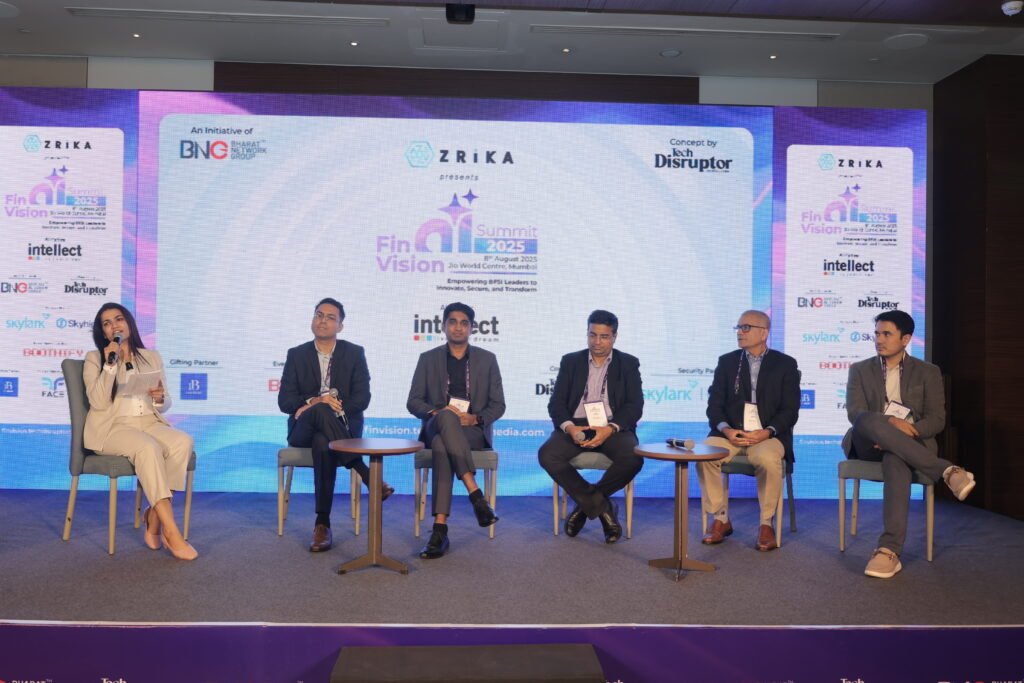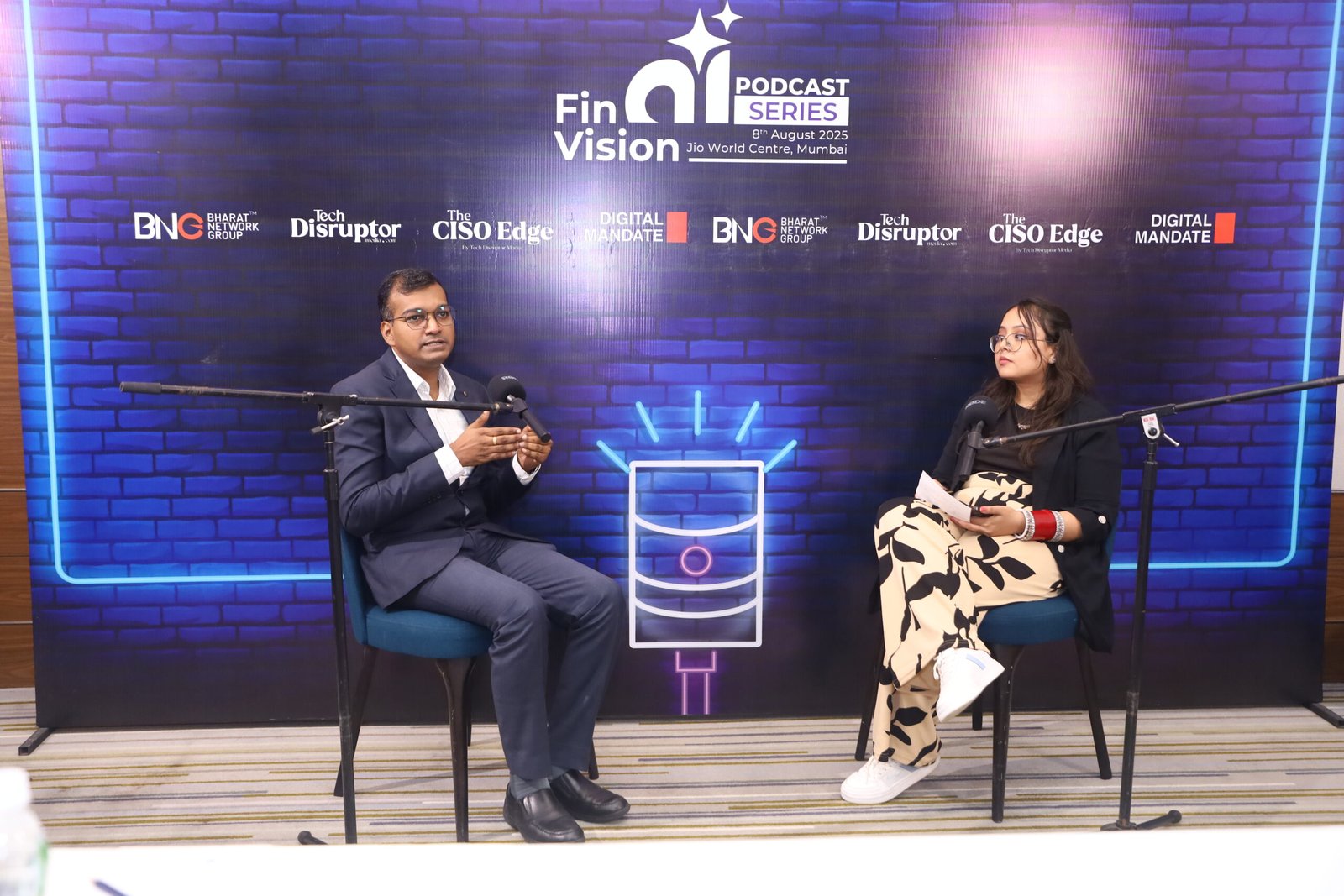The Indian Banking, Financial Services, and Insurance (BFSI) sector is undergoing a profound transformation propelled by Artificial Intelligence (AI), moving beyond the earlier stage of experimentation into mainstream operational use. Recent discussions involving leading industry experts across diverse financial sub-sectors reveal a clear consensus: AI is now a powerful tool reshaping financial inclusion, operational efficiency, and customer experience in 2024.

Practical AI applications driving inclusion and risk intelligence
One of the most striking shifts is the use of AI in credit underwriting, particularly for segments historically underserved by credit markets. At FinVision AI Summit held on 8th August 2025, at Jio World Convention Center, leaders like Apoorv Jhaa, SVP and Head at of UGRO Capital exemplify how AI is enabling lenders to penetrate the “invisible” MSME sector by leveraging multi-dimensional and alternative data sources well beyond traditional credit reports. This nuanced risk assessment, assisted by video analytics and geographic data, marks a new frontier in lending, expanding credit accessibility meaningfully.
Similarly, Sunil Yadav of Satin Creditcare Network highlights how AI-driven geographic and environmental models help predict risks like flood-induced defaults, reinforcing AI’s adaptability in rural microfinance ecosystems where data is sparse and clients are often digitally excluded. These real-world use cases emphasize AI’s unique ability to create financial products and risk models tailored to complex, non-traditional credit profiles, vital for India’s pursuit of inclusive growth.
Internal productivity and AI as a strategic Co-Pilot
While external lending innovations gain attention, the BFSI sector is concurrently experiencing an internal productivity revolution powered by AI. Nishant Pradhan, CAIO at Mirae Asset Mutual Fund, articulates a vision where AI acts as a unifying agent across disparate tools and tasks, simplifying workflows from HR to portfolio management. This reframing of AI as an assistant rather than a job replacer resonates strongly, encouraging organizations to embrace automation to enhance human creativity and decision-making rather than fearing displacement.
Vitthal Naik, CTO at Profectus, shared insights on using AI-powered automation to drastically reduce SME onboarding durations and demonstrate tangible productivity gains. His company’s use of document recognition and policy automation accelerates loan processing and enhances customer satisfaction—key metrics for competitive differentiation in BFSI.
Combating fraud and unlocking the No-Credit-History segment
Perhaps AI’s most transformative impact is in addressing fraud and enabling lending to individuals without formal credit histories (NTC). Dipesh Karki, CPTO at LenDen Club, shares how AI and machine learning models now enable loan approvals without traditional documents, using advanced fraud detection on bank statements and alternative data. Serving 30-35% of their portfolio to this segment, Lendbox showcases how AI is rewriting lending norms and extending financial services to millions outside conventional credit lines.
This innovation reflects a broader trend within BFSI: AI-powered underwriting and fraud prevention are becoming indispensable for market expansion and risk mitigation.
Persistent challenges and the path forward
Despite these successes, the panel acknowledged that AI’s journey in BFSI is not without hurdles. Data scarcity, especially in rural areas with limited smartphone penetration, continues to constrain AI’s efficacy, creating “ghost customers” that digital models struggle to capture accurately. Cash’s entrenched role in many markets remains a blind spot, complicating digital transformation and data-driven decision-making.
Moreover, technical challenges with AI reliability, such as hallucinations and poorly contextualized responses in voice bots, are active development areas. Realizing the promise of natural, trustworthy AI interactions will require ongoing innovation in model contextualization and user experience design.
Regulatory and ethical considerations
The rapid integration of AI in BFSI also raises critical regulatory and ethical questions. Evolving regulations around data privacy, fairness in algorithmic decisions, and transparency demand that financial institutions deploy AI responsibly. Ensuring ethical AI practices will be essential not only to comply with legal standards but also to build customer trust and avoid bias in credit and fraud decisions.
Collaboration between startups and established players
Dynamic collaborations between fintech startups and traditional financial institutions further accelerate the AI momentum in Indian BFSI. Such partnerships leverage the innovation agility of startups and the scale and experience of established players to rapidly develop and deploy AI-driven solutions, accelerating industry-wide transformation and reaching wider customer bases effectively.
Role of AI in Customer Experience and Personalization
Beyond underwriting and operations, AI is revolutionizing customer experience in BFSI. Personalized financial products, intelligent chatbots, and real-time advisory powered by AI-driven sentiment analysis are helping firms deepen customer engagement. This hyper-personalization enhances satisfaction and drives cross-selling and loyalty in an increasingly competitive market.
Future Technologies Complementing AI
AI’s impact is amplified by its convergence with other emerging technologies. Blockchain ensures secure, transparent transactions; edge computing reduces latency, enabling faster decision-making in remote areas; and 5G connectivity expands AI services to rural markets. Together, these technologies build a robust digital financial ecosystem that can respond swiftly and securely to customer needs.
Workforce Transformation and Skill Development
As AI assumes a greater role, transforming BFSI’s workforce is imperative. Upskilling employees to leverage AI tools effectively, fostering a culture of continuous learning, and creating new roles such as AI ethicists and data scientists are critical for sustaining innovation and maintaining competitive advantage.
Impact on Financial Inclusion and Socioeconomic Development
AI-powered innovation is also a major driver of financial inclusion, extending credit, insurance, and savings solutions to previously marginalized populations. This inclusion catalyzes broader socioeconomic benefits, such as poverty reduction, growth of micro-entrepreneurship, and sustainable economic development, reinforcing BFSI’s role as an engine of inclusive growth for India.
Strategic Recommendations: Discipline, Data, and Letting AI Do the Grunt Work
The panelists’ concluding advice highlights critical success factors for BFSI’s AI evolution:
- Apoorv Jhaa urges improved scale and security transparency in AI models, which are essential as LLMs and AI solutions become embedded in critical financial processes.
- Nishant Pradhan emphasizes AI’s role in enforcing organizational discipline through better data strategies and goal alignment.
- Vitthal Naik calls for strong foundational data governance and starting AI adoption with simple, high-impact use cases to build momentum.
- Dipesh Karki’s powerful mantra, “Let AI do your mundane work while you do the smart one,” encapsulates the cultural shift organizations must embrace.
Conclusion: AI as a Catalyst for Inclusive, Intelligent Finance
India’s BFSI sector is transitioning from AI’s experimental phase to strategic adoption, transforming everything from underwriting and fraud detection to operational productivity. This evolution promises efficiency gains and a deeper financial inclusion impact by serving the underserved and unbanked populations.
The future of BFSI lies in harnessing AI’s power to augment human skills and break data silos, building smarter, more adaptive financial ecosystems that respond dynamically to evolving customer needs and market risks. As AI technologies mature and regulatory frameworks evolve, India is poised to lead a new era of intelligent and inclusive finance—where innovation and empathy go hand in hand.
This ongoing journey presents exciting opportunities and challenges for BFSI players, technology providers, and regulators alike. The key will be to balance cutting-edge AI innovation with disciplined data governance and a human-centric approach, ensuring that AI fulfills its promise as a transformational force for good in India’s diverse financial landscape.




